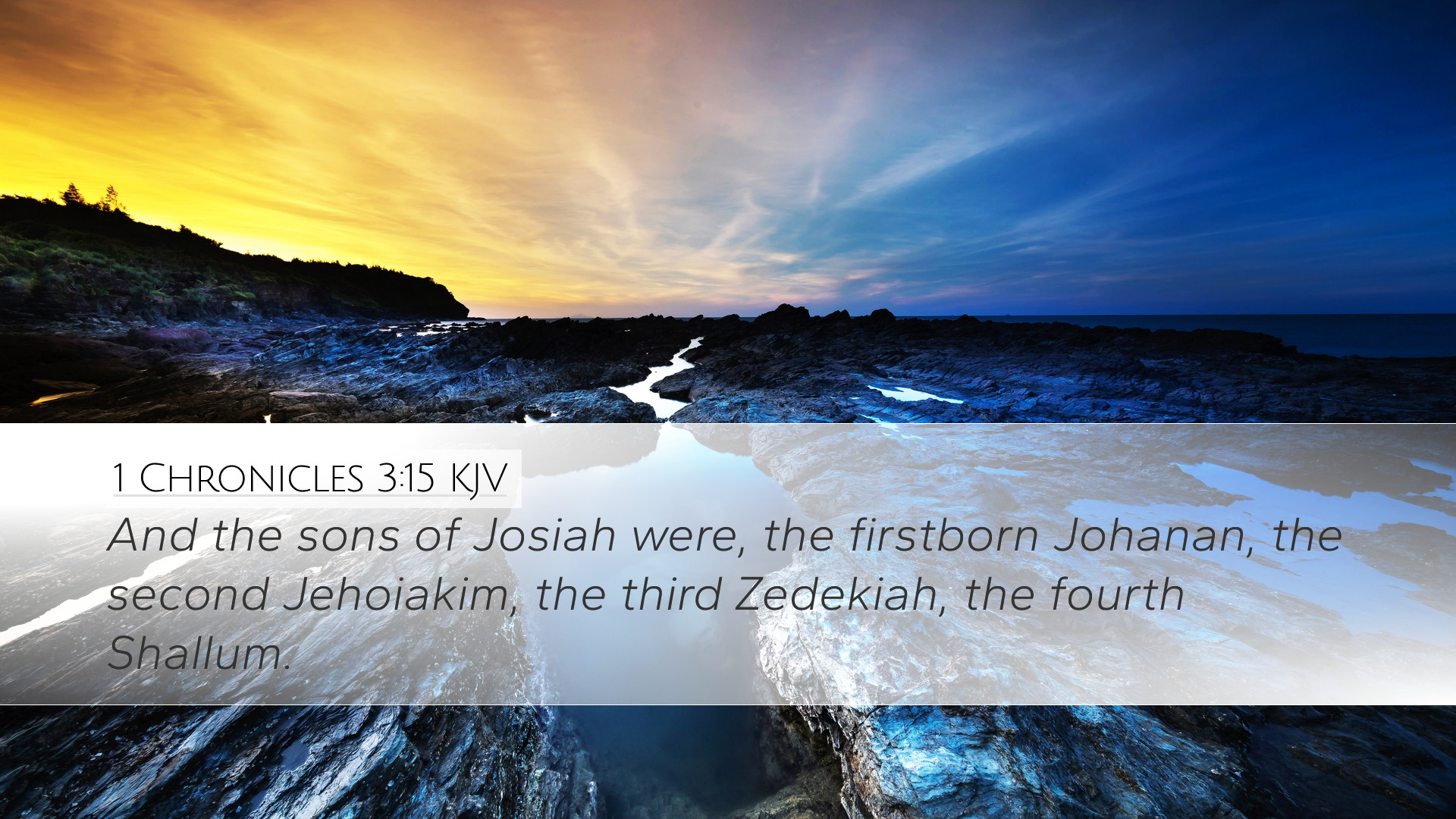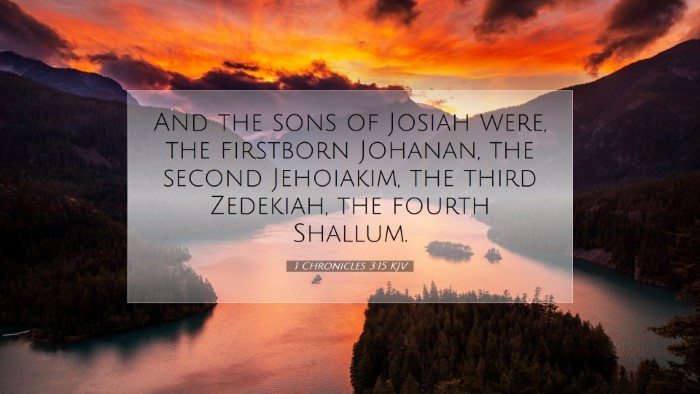Commentary on 1 Chronicles 3:15
Verse: 1 Chronicles 3:15
“The sons of Josiah were, the firstborn Johanan, the second Jehoiakim, the third Zedekiah, the fourth Shallum.”
Introduction
This verse is nestled within a genealogical account that continues throughout the early chapters of 1 Chronicles. It provides a critical insight into the lineage of the kings of Judah, emphasizing the importance of heritage and succession in the context of God’s covenant with David. This commentary synthesizes insights from various public domain scholars to illuminate the significance of this passage.
Genealogical Importance
The genealogies in the Bible often serve as a narrative bridge, connecting the past with the present. Matthew Henry notes that the genealogy of Josiah's sons highlights the fulfillment of divine promise concerning the Messianic line. Each name in this lineage carries weight, portraying not just individual destinies but also the overarching divine plan.
- Josiah: The context here pertains to Josiah, a king known for his reforms and commitment to restoring true worship in Judah.
- Johanan: The firstborn, which in ancient Israel carries the significance of the family inheritance and authority.
- Jehoiakim: The second son later became king but was noted for his rebellion against God, illustrating the struggles within God’s chosen line.
- Zedekiah: Jehoiakim's successor was the last king of Judah before the Babylonian exile, reflecting the tragic downfall of the Davidic line.
- Shallum: His mention indicates further developments in Israel’s history and genealogy, though less is recorded about him.
Theological Reflections
Albert Barnes offers insightful theological observations about this lineage, positing that the account serves to remind readers of God’s unwavering commitment to His covenant. Despite the varying paths taken by Josiah's sons, God’s plan remains intact, which is a crucial understanding for pastoral application. Each king's actions contribute to the overarching narrative of redemption found throughout Scripture.
The mention of Josiah’s sons also signals a divine judgment motif, prevalent in 1 Chronicles. The contrasting narratives of their reigns reveal God’s expectation of faithfulness among His people. Adam Clarke emphasizes that such genealogical records are not mere historical accounts but are imbued with spiritual significance that reinforces the faithfulness of God amid human failure.
Historical Context
To appreciate the weight of this passage, it is essential to consider the historical backdrop in which it was written. Following the Babylonian exile, these genealogies served as a comforting reminder of God's continued faithfulness despite the apparent breaks in royal continuity.
Matthew Henry remarks on the significance of restoration in the post-exilic community. The listing of these sons becomes a source of identity and hope for those returning to rebuild Jerusalem. It affirms the continuity of God’s purposes amidst hardship. Each name represents a link to their glorious past and the hope for a renewed future in alignment with the promises made to David.
Application for Leaders and Scholars
This verse, although brief, prompts profound reflection for pastors, students, and theologians alike. In a time where church leadership resembles the tumult experienced during the reigns of Josiah's sons, the call for integrity and faithfulness remains paramount.
- Pastoral Leadership: Leaders must reflect on their spiritual lineage—what legacy are they building for future generations? Like Josiah striving for restoration, modern leaders are encouraged to pursue the heart of God diligently.
- Theological Studies: Scholars may investigate the implications of Judah's royal history on modern ecclesiology. How do these narratives inform our understanding of God’s providence and governance?
- Identity in Christ: Students of the Word can draw parallels from the uncertainties faced by these kings to their own quest for meaning and purpose. Just as Josiah’s lineage has a significant role in history, believers are called to fulfill God’s plan within their generational contexts.
Conclusion
1 Chronicles 3:15 serves as a poignant reminder of the weighty implications of lineage and the ongoing narrative of God’s faithfulness through the tumultuous history of Israel’s kings. As we explore the significance of these names and their implications within the broader biblical narrative, may we be encouraged to recognize our part in the divine story. Just as God raised Josiah and his descendants for a specific purpose, He invites us into His unfolding plan today. Each reflection leads us back to the heart of God’s redemptive work through His covenant, challenging us to remain faithful to His calling in our lives.


